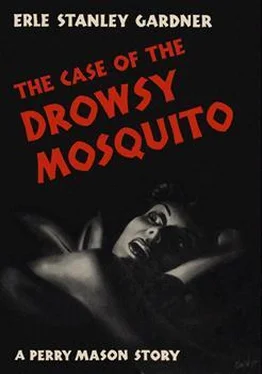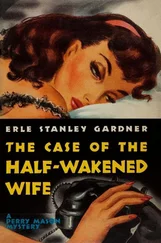“And I,” Dr. Kenward explained, “decided that I needed to really rest. I think Velma was the go-between who fixed it up with Salty. I’m certainly indebted to him for taking me along.”
“This is Banning Clarke’s claim?” Mason asked.
“It is now,” Salty said; then, looking at his watch, amended, “It will be at midnight. That’s when the option expires.”
“Of course,” Mason pointed out, “they could exercise that option between now and midnight.”
“They could,” Salty observed dryly.
Dr. Kenward said abruptly, “I’m going to say something about that murder, and then, if it’s all the same to you, I think it would be a fine idea to quit talking about it.”
“That,” Salty announced with feeling, “suits me.”
“What was it you wanted to say?” Mason asked.
Dr. Kenward said, “While the police haven’t taken me into their confidence, I assume it’s their theory someone tried to shoot me under the mistaken impression that I was Banning Clarke.”
“So I gather,” Mason said. “But the police don’t exactly confide in me, either.”
“Of course, it’s an obvious conclusion. I had wandered out to the place where Banning Clarke would have been camped if he hadn’t pulled out. I was visible in the moonlight only as a sleeping figure swathed in blankets. Quite obviously any person who didn’t know that Clarke had left for the desert, and who wanted to kill him, would have assumed that I was Clarke.”
Mason nodded.
“But,” Dr. Kenward went on, “I have been wondering whether such was actually the case.”
“You mean someone tried to kill you knowing who you were?”
“It’s a possibility.”
“And the motive?” Mason asked.
Dr. Kenward hesitated. “Come on,” Mason prompted. “There could be only one motive — certain information that you possess. What is it?”
“I hadn’t intended to go quite that far when I started talking about it,” Dr. Kenward said.
“Well, we’ve gone that far now,” Mason told him. “I should say, Doctor, that it was some bit of medical information you had uncovered — something about the poisoning, perhaps. And I think it’s only fair to all concerned, including yourself, that you should tell us.”
Dr. Kenward laughed. “You have all but deduced what it is. Purely as a matter of routine, I saved some of the stomach contents on the occasion of that first poisoning. That, you will remember, was the occasion when we found arsenic in the private saltcellar used only by the Bradissons.”
“And what,” Mason asked, “did you find?”
“A report on the analysis of the stomach content,” Dr. Kenward said, “reached me just before I left town. It was, of course, given to me over the telephone; but the analysis shows that there was no trace of arsenic.”
“Then what,” Mason asked, “induced the symptoms?”
“Apparently, ipecac.”
“And what,” Mason pressed, “would be the object of taking ipecac?”
“To induce certain symptoms of arsenic poisoning.”
“And what would be the object of inducing those symptoms, Doctor?”
Dr. Kenward said dryly, “That is a question, Mr. Mason, which comes within your department. I am reporting only the medical facts.”
“But how about the metallic taste in the throat, the cramps, the general soreness?”
“I have questioned Velma about that very carefully,” he said. “As nearly as she can recollect now, she may have been the one to suggest those symptoms. I have asked her particularly whether, when she first began to suspect the possibility of arsenic poisoning, she didn’t ask the patients if they were suffering from cramps, general abdominal pain, a metallic burning sensation in the back of the mouth, and cramps in the legs. She can’t remember now whether she asked that question of the patients, or whether they told her they were experiencing such symptoms.”
“Does it make a great deal of difference?” Mason asked.
“A very great deal. Whenever a patient becomes violently ill, there is usually a certain element of depression, quite frequently a receptivity to suggestion, occasionally definite symptoms of hysteria. Under those circumstances a person normally experiencing a part of the symptoms which accompany a certain disease, and learning of other symptoms which are supposed to go hand in hand, will immediately develop those other symptoms.”
“You’re certain it was arsenic in the saltcellar?” Mason asked.
“There can be no doubt of that. The analysis shows it.”
“Then why was the arsenic placed in the saltcellar?”
“That also is a question which is in your department rather than mine. But there are obviously two alternatives. One is that the arsenic was put in the saltcellar by someone who knew that the Bradissons were suffering from a poisoning, the symptoms of which resembled arsenic poisoning, and for some reason wanted to make it appear arsenic poisoning had been attempted.”
“And the other alternative?” Mason asked.
“Is that someone actually tried to poison the Bradissons, that the poison was intended to take effect some time during the next day when the Bradissons would use the saltcellar, that through some peculiar coincidence, and from an undisclosed source, the Bradissons ingested a sufficient quantity of ipecac to produce violent illness.”
Mason said, “I will ask you this, Doctor. Have you considered the possibility that the ipecac was taken by the Bradissons themselves with the deliberate intention of simulating the symptoms of arsenic poisoning?”
“Purely as a man of science trying to explore all possibilities which would account for all of the symptoms I encountered, I have taken that into consideration.”
“Is there any evidence to support it?”
“None.”
“It is a logical explanation?”
“There is no evidence against it.”
“And you feel someone tried to murder you because you had this information?”
“It is a possibility.”
They were silent for nearly a minute, then Mason said, “I want to think that over. In the meantime, I’m going to get my sleeping bag spread out.”
Mason walked over to the car, pulled out the sleeping bags, fitted the power pump to the motor, inflated the air mattresses, and looked up to find Salty Bowers at his side.
“Have you,” Mason asked, “staked out any particular sleeping quarters?”
“We’ve got a tent,” Salty said. “The girls can use it for a dressing-room. They won’t want to sleep in it. It’s better to sleep out under the stars.”
“Then let’s put Miss Street’s sleeping bag over by the tent,” Mason said. “Where are you sleeping?”
Salty lowered his voice. “I’m not too easy in my mind about what’s been going on. I’ve pulled my blankets down the trail a piece where I can sort of keep watch in case anybody should come pussyfooting along. — You pick up that end of the sleeping bag, I’ll pick up this end and we’ll carry it over. And when we get done, the tea will be just about ready to drink.”
When the sleeping bags had been placed in position and the duffel bags brought out of Mason’s car, the little group gathered once more around the fire. Salty put an armful of sagebrush on the fire, which promptly crackled into brilliance, a circle of illumination chasing back the encroaching shadows.
Salty poured tea, said, “The air’s different out here somehow.”
“It most certainly is,” Mason said. “Dry and clear.”
“A few months ago I developed a sinus condition,” Dr. Kenward said. “It’s clearing up out here with great rapidity. I am most encouraged.”
“How’s the wound?” Mason asked.
Читать дальше












